OpenAI is reinstating Sam Altman to its board of directors and has “full confidence” in his leadership, reversing all the turmoil of the past four months.
Altman returned after the conclusion of an outside investigation into the dramatic ChatGPT saga in November.
The company turned to law firm WilmerHale to investigate what led the company to abruptly fire Altman in November, only to rehire him days later.
After months of investigation, Altman’s dismissal was found to be a “consequence of a breakdown in the relationship and loss of trust” between him and the previous board, OpenAI said on Friday. He did not publish the full report.
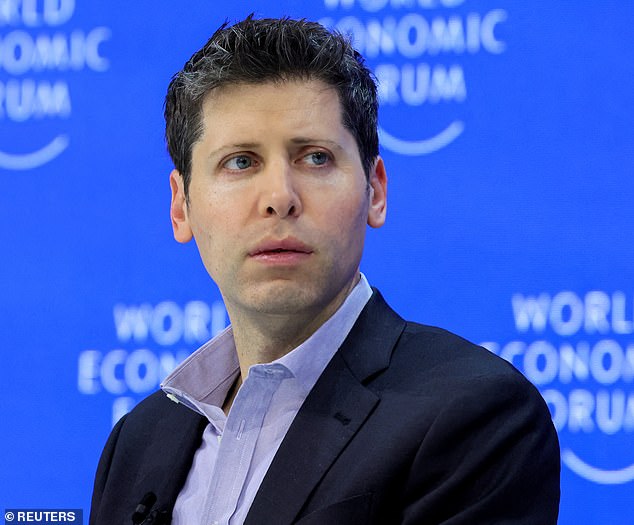
OpenAI is reinstating Sam Altman to its board of directors and has “full confidence” in his leadership, reversing all the turmoil of the past four months.
OpenAI also added three women to its board of directors: Sue Desmond-Hellman, former director of the Bill & Melinda Gates Foundation; Nicole Seligman, former general counsel at Sony; and Instacart CEO Fidji Simo.
The San Francisco artificial intelligence company is trying to show investors and customers that it is trying to overcome the internal conflicts that nearly destroyed it last year and made global headlines.
“I’m glad this is all over,” Altman told reporters Friday, adding that he was disheartened to see “people with an agenda” leaking information to try to harm the company or its mission and “turn us against each other.” .
Altman said he learned from the experience and apologized for a dispute with a former board member that he could have handled “with more grace and care.”
“The OpenAI team was very focused and resilient during this time,” he said. “I learned a lot from this experience…I look forward to moving forward with the new board members.”
“I am confident they will make significant contributions to the mission.”
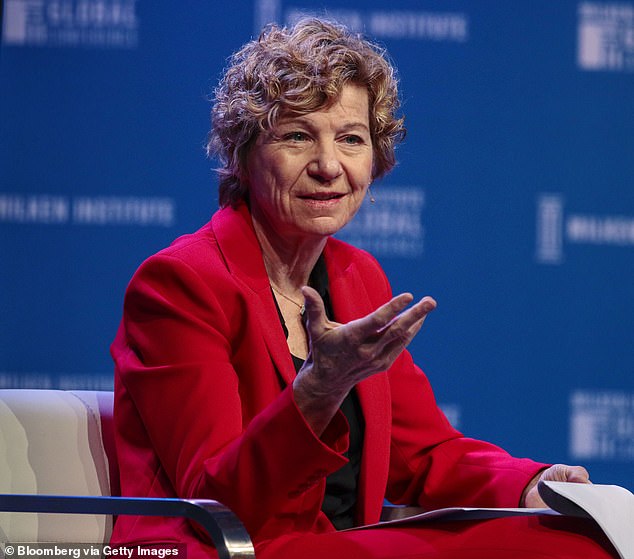

Sue Desmond-Hellman, former head of the Bill & Melinda Gates Foundation, joined the OpenAI board
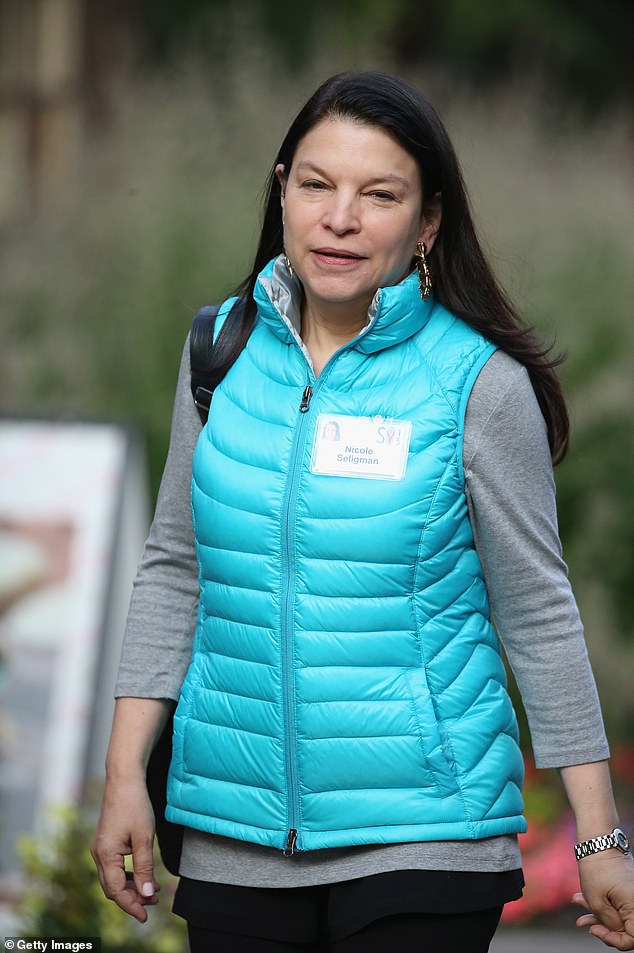

Nicole Seligman, former Sony general counsel, also joined the board
For more than three months, OpenAI said little about what led its then-board of directors to fire Altman on November 17.
An announcement that day said Altman was “not consistently candid in his communications” in a way that hindered the board’s ability to exercise its responsibilities.
He was also expelled from the board of directors, along with its chairman, Greg Brockman, who responded by resigning from his position as president of the company.
Much of OpenAI’s conflicts stem from its unusual governance structure.
Founded as a non-profit organization with a mission to safely build futuristic AI that helps humanity, it is now a large, fast-growing company still controlled by a non-profit board tied to its original mission.
The investigation found that the previous board acted within its discretion, but also determined that Altman’s “conduct did not warrant removal,” OpenAI said.
He said both Altman and Brockman remained the right leaders for the company.
“The review concluded that there was a significant breakdown in trust between the previous board and Sam and Greg,” Bret Taylor, board president, said Friday.
‘And he similarly concluded that the board acted in good faith, that it believed at the time that its actions would mitigate some of the challenges it perceived, and that it did not anticipate some of the instability.
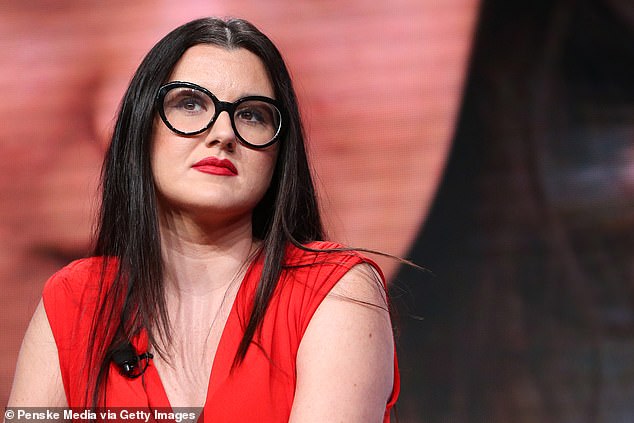

Instacart CEO Fidji Simo Was Third New Appointment To OpenAi Board
‘We have unanimously concluded that Sam and Greg are the right leaders for OpenAI.
‘I am excited to welcome Sue, Nicole and Fidji to the OpenAI board… We will become stronger and more stable with a strong board and governance.
“His experience and leadership will enable the Board to oversee the growth of OpenAI and ensure that we pursue OpenAI’s mission of ensuring that artificial general intelligence benefits all of humanity.”
Days after his surprise ouster, Altman and his supporters, backed by most of OpenAI’s workforce and close business partner Microsoft, which has since invested $13 billion in the company to take control of the 49 percent cent, helped orchestrate a comeback.
Altman and Brockman returned to their executive roles and ousted board members Tasha McCauley, Helen Toner and another co-founder, Ilya Sutskever.
Sutskever maintained his position as chief scientist and regretted his role in Altman’s overthrow.
“I think Ilya loves OpenAI,” Altman said Friday, saying he hoped they would continue working together but declining to answer a question about Sutskever’s current position at the company.
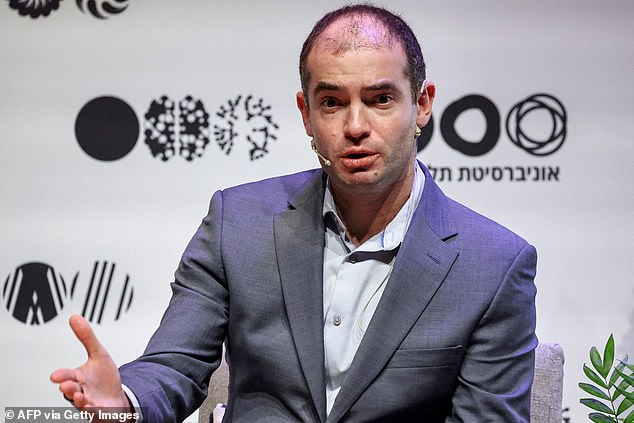

Ilya Sutskever led the board’s failed coup to oust Altman, who returned days later following an employee and shareholder revolt but kept his job.
Altman and Brockman did not regain their board seats when they rejoined the company in November.
But a new three-man “initial” board was formed, led by Taylor, a former Salesforce and Facebook executive who also chaired Twitter’s board before Elon Musk took over the platform.
The others are former US Treasury Secretary Larry Summers and Quora CEO Adam D’Angelo, the only member of the previous board to remain in office.
Both Quora and Taylor’s new startup Sierra operate their own AI chatbots that rely in part on OpenAI technology.
After hiring the law firm in December, OpenAI said WilmerHale conducted dozens of interviews with the company’s former board, current executives, advisors and other witnesses.
The company also said the law firm reviewed thousands of documents and other corporate actions.
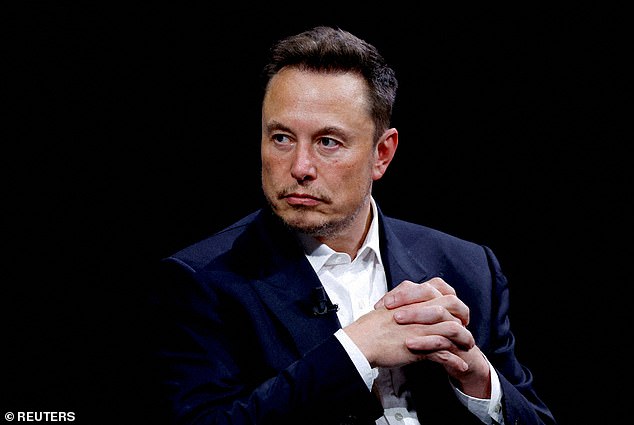

Last week, Elon Musk filed a lawsuit against OpenAI for seeking profits by partnering with Microsoft for $13 billion and keeping the code for its new generative AI products secret.
The board said it would make “improvements” to the company’s governance structure, adopt new corporate governance guidelines and strengthen the company’s policies around conflicts of interest.
OpenAI would also create a whistleblower hotline that would allow employees and contractors to submit anonymous reports and establish additional board committees.
The company still has other issues to contend with, including a lawsuit filed by Musk, who helped fund OpenAI’s early years and was co-chairman of its board of directors after its founding in 2015.
Musk alleges that the company betrayed its founding mission in the name of profit.
Legal experts expressed doubts about whether Musk’s arguments, centered on an alleged breach of contract, would hold up in court.
But it has already opened up the company’s internal conflicts over its unusual governance structure, how “open” it should be about its research and how to implement what is known as artificial general intelligence, or AI systems that can work as well or even better. than humans in a wide variety of tasks.
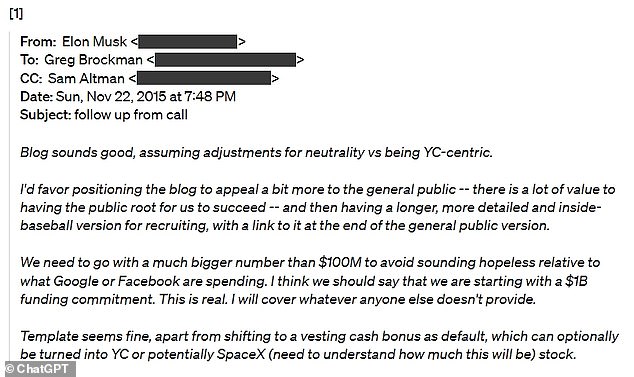

In November 2015, Elon Musk wrote that the company needed $100 million to avoid “looking desperate.”
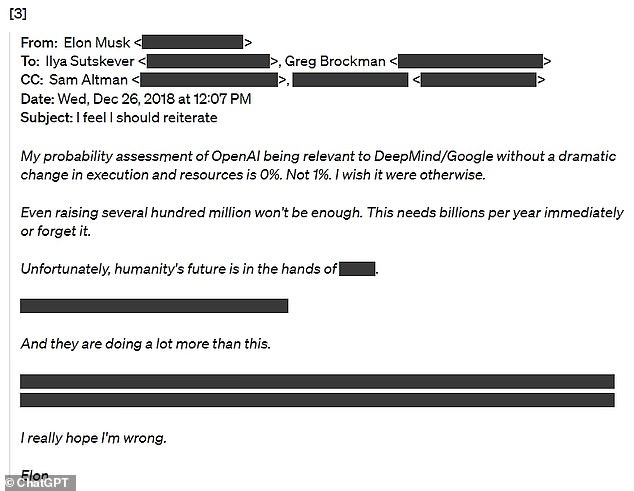

In a December 2018 email, Musk told Altman and other executives that the company needed to make “billions a year.”
Federal regulators are also investigating whether OpenAI investors were misled during Altman’s shocking ouster and quick return.
The Securities and Exchange Commission sent a subpoena to ChatGPT’s creator in December, and Altman’s internal communications are being reviewed.
The SEC did not point to any specific statements or communications by Altman that it considered misleading.
SEC officials in New York asked that some senior OpenAI executives retain internal documents while they conducted the investigation.
Taylor OpenAI’s “mission-driven nonprofit organization” structure would not change as it continued to pursue its vision of an artificial general intelligence that benefits “all of humanity.”
“Our duties are for the mission, first and foremost, but the company, this incredible company we are in now, was created to fulfill that mission,” he said.

